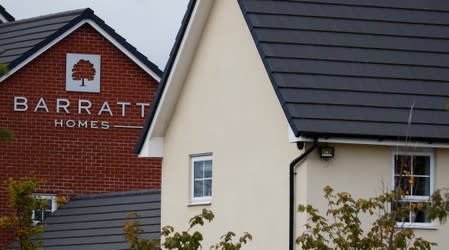UK homebuilder Barratt battles Brexit price pressure

By Pushkala Aripaka and Samantha Machado
(Reuters) - Britain's biggest housebuilder Barratt Developments reported marginal sales growth and a dip in the value of homes sold in the first months of its financial year, the latest sign of pressure on developers from a weakening UK property market.
Shares in the Midlands-based builder slid as much as 4% in morning trade after it stuck by its medium-term financial targets, but said forward sales were down in value in the first 15 weeks of the year starting in July. The stock later recovered and was down 0.5% as of 1440 GMT.
The company said it was making progress on its plans to improve profit margins and pushed its underlying average rate of sales per site up, along with a jump in home completions.
The signs of weakening prices, however, as Barratt swings towards delivering more lower-priced homes, chimed with those of smaller competitor Bellway earlier this week and came with a warning of the risks of Brexit.
"Whilst there is economic and political uncertainty, we continue to be disciplined and have a strong balance sheet and cash position," Barratt said.
With about two weeks to go before the United Kingdom is due to leave the world's biggest trading bloc, it remains unclear on what terms it will leave or indeed whether it will leave at all, despite progress in talks in the past week.
UK house price growth has been flattening off for months as buyers worry the split might bring a deeper shock while outright falls in prices in London have driven developers to change strategy to cope.
Barratt has been trying to cut costs by changing the design of the houses it builds - reducing the roof pitch and height of houses to cut labour and materials costs - and reducing exposure to central London.
Russ Mould, investment director at AJ Bell, cast doubt on whether the company would be able to resist the pressures created by the weakening market and rising building costs.
"Barratt is still talking about achieving 'margin improvements', crucially without compromising quality – or in other words without building lower calibre houses," Mould said.
"Either Barratt has found an approach that has eluded its rivals or it seems likely shareholders will face disappointment at some stage."
Barratt reiterated that it expects the volume of house sales to grow towards the lower end of its medium-term target range of 3% to 5% annually.
Total forward sales, including joint ventures as on Oct. 13, rose to 12,963 units from 12,903 units a year earlier while the value of those homes declined 2.4% to 3.07 billion pounds.
(Reporting by Samantha Machado and Pushkala Aripaka in Bengaluru; Editing by Subhranshu Sahu/Elaine Hardcastle/Jane Merriman)
